Angela Slatter's Blog, page 78
August 10, 2015
The 2nd Spectral Book of Horror Stories: Richard Jay Goldstein
 Richard Jay Goldstein has been writing fiction and non-fiction for a bit over twenty-five years. He lives with his wife and kids and grandkids in the mountains east of Santa Fe, New Mexico, where it’s still pretty quiet, thanks. He’s a lapsed ER doc, and has published fifty-something stories and essays in the literary and sci-fi/fantasy/horror presses, including a number of anthologies. He’s also had two Pushcart nominations, but neither got in.
Richard Jay Goldstein has been writing fiction and non-fiction for a bit over twenty-five years. He lives with his wife and kids and grandkids in the mountains east of Santa Fe, New Mexico, where it’s still pretty quiet, thanks. He’s a lapsed ER doc, and has published fifty-something stories and essays in the literary and sci-fi/fantasy/horror presses, including a number of anthologies. He’s also had two Pushcart nominations, but neither got in.
What inspired your story “Toys from the Gingerbread Country”?
Asking what inspired a story is asking where stories come from. Sometimes I feel like an innocent bystander in that process. In this case the story started with the title (“Toys From the Gingerbread Country”). Then the title sat down in the soup-kitchen of my mind next to an idle thought: “If houses can be haunted, what about dollhouses?” When almost-ten Katie walked in, it was a done deal. From that meeting grew this story, but there are probably more stories in the litter. One of the joys of writing fiction, to my mind, is watching stories emerge from the murk of the collective unconscious.
What’s the first horror story you can remember making a big impact on you?
It would have to have been “Who Goes There?” by John Campbell (writing as Don A. Stuart), a story often mistaken for sci-fi. Oh yeah, and everything Poe ever wrote.
Name your three favourite horror writers.
Could I name my favorite child instead? Well, if I have to: HP Lovecraft. Neil Gaiman. Clive Barker. (I duly note that two are Brits….) But there are a score more.
Is your writing generally firmly in the horror arena or do you do occasional jaunts into other areas of speculative fiction?
I like to play all over the spec-fic sandbox. And sometimes even swing on the straight literary swing-set.
What’s in your to-be-read pile at the moment? 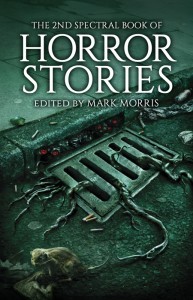
Okay, wait, let me look… The book pile includes Pére Goriot by Honoré De Balzac, The Essential Kabbalah by Daniel C. Matt, The History of Hell by Alice K. Turner. The Kindle queue includes Lovecraft’s Monsters, edited by Ellen Datlow, Stardust by Neil Gaiman, Invisible Cities by Italo Calvino, and the complete works of HP Lovecraft, which I am once again working my way through.
The 2nd Spectral Book of Horror Stories can be pre-ordered here.
August 9, 2015
Flight – the first inking
Please note: Tiny Owl in tree.
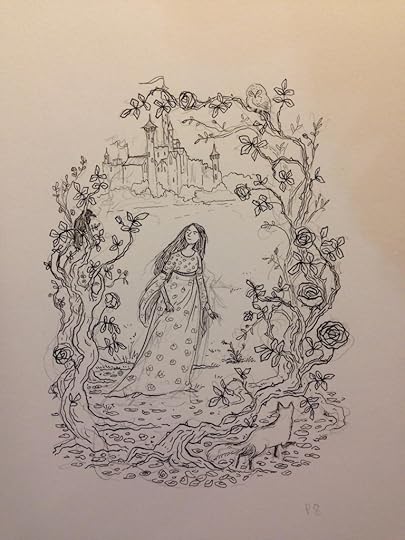
Emer in the garden, Kathleen Jennings
Pre-order She Walks in Shadows!
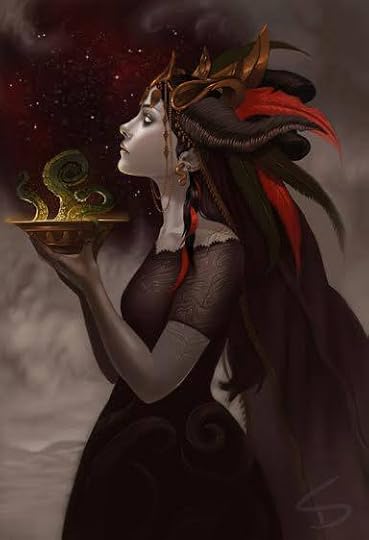
Amazing cover art by Sara Diesel
Woohoo! She Walks in Shadows is available for pre-order. Go here!
They emerge from the shadows, to claim the night ….
Women from around the world delve into Lovecraftian depths, penning and illustrating a variety of Weird horrors. The pale and secretive Lavinia Whatley wanders through the woods, Asenath is a precocious teenager with an attitude, and the Ancient Egyptian pharaoh Nitocris has found a new body in distant America. And do you have time to hear a word from our beloved mother Shub-Niggurath?
Defiant, destructive, terrifying, and harrowing, the women in She Walks in Shadows are monsters and mothers, heroes and devourers. Observe them in all their glory. Iä! Iä!
Table of Contents
“Bitter Perfume” Laura Blackwell
“Violet is the Color of Your Energy” Nadia Bulkin
“Body to Body to Body” Selena Chambers
“Magna Mater” Arinn Dembo
“De Deabus Minoribus Exterioris Theomagicae” Jilly Dreadful
“Hairwork” Gemma Files
“The Head of T’la-yub” Nelly Geraldine García-Rosas (translated by Silvia Moreno-Garcia)
“Bring the Moon to Me” Amelia Gorman
“Chosen” Lyndsey Holder
“Eight Seconds” Pandora Hope
“Cthulhu of the Dead Sea” Inkeri Kontro
“Turn out the Lights” Penelope Love
“The Adventurer’s Wife” Premee Mohamed
“Notes Found in a Decommissioned Asylum, December 1961? Sharon Mock
“The Eye of Juno” Eugenie Mora
“Ammutseba Rising” Ann K. Schwader
“Cypress God” Rodopi Sisamis
“Lavinia’s Wood” Angela Slatter
“The Opera Singer” Priya Sridhar
“Provenance” Benjanun Sriduangkaew
“The Thing in The Cheerleading Squad” Molly Tanzer
“Lockbox” E. Catherine Tobler
“When She Quickens” Mary Turzillo
“Shub-Niggurath’s Witnesses” Valerie Valdes
“Queen of a New America” Wendy N. Wagner
The 2nd Spectral Book of Horror Stories: Ian Rogers
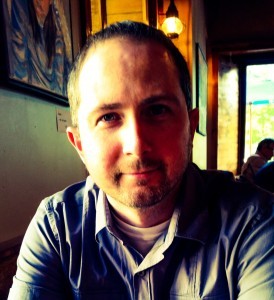 Ian Rogers is the award-winning author of the dark fiction collection Every House Is Haunted. His novelette, “The House on Ashley Avenue,” was a finalist for the Shirley Jackson Award and has been optioned for television by Universal Cable Productions. For more information, visit ianrogers.ca.
Ian Rogers is the award-winning author of the dark fiction collection Every House Is Haunted. His novelette, “The House on Ashley Avenue,” was a finalist for the Shirley Jackson Award and has been optioned for television by Universal Cable Productions. For more information, visit ianrogers.ca.
What inspired your story “The Veils”?
I was thinking about the strangeness in everyday life, and how one unusual event can set a story rolling. For some reason this made me think of stock photography, and what would happen if someone noticed something strange in a series of photos that suggested a larger conspiracy.
What’s the first horror story you can remember making a big impact on you?
“The Mist,” by Stephen King.
Name your three favourite horror writers. 
Stephen King, Shirley Jackson, and Algernon Blackwood.
Is your writing generally firmly in the horror arena or do you do occasional jaunts into other areas of speculative fiction?
I write a bit of everything — urban fantasy, detective fiction, comedy, weird western — but horror is definitely where my heart lies.
What’s in your to-be-read pile at the moment?
“The Acolyte,” by Nick Cutter, “In the Woods,” by Tana French, and “Burnt Black Suns,” by Simon Strantzas.
The 2nd Spectral Book of Horror Stories can be pre-ordered here.
August 6, 2015
Reminder: Bitterwood Giveaway on Goodreads
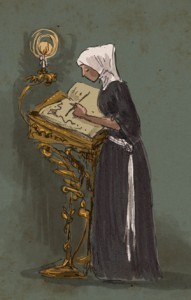 Just a quick reminder that we’re giving away a copy of The Bitterwood Bible and Other Recountings on Goodreads – go here and enter.
Just a quick reminder that we’re giving away a copy of The Bitterwood Bible and Other Recountings on Goodreads – go here and enter.
Flight is coming together …
… because Kathleen has been banished to the art mines, where she is toiling over the illustrations for our story book, Flight, so it will be ready in time for Christmas orders this year. Here are some roughs, from which I’ve photoshopped the blood, sweat, and tears. Ping Tiny Owl Workshop.
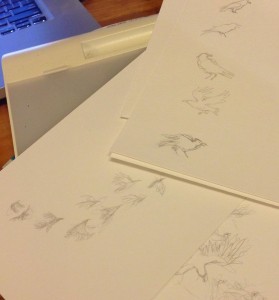
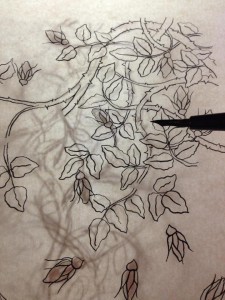
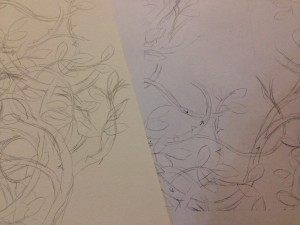
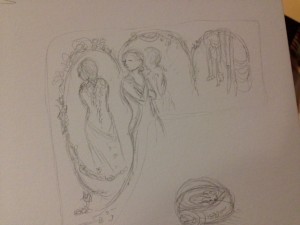
August 5, 2015
The 2nd Spectral Book of Horror Stories: Simon Kurt Unsworth
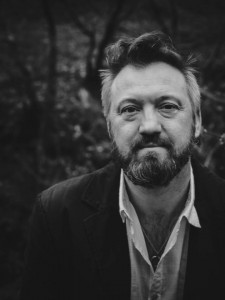
Simon Kurt Unsworth is the author of the recent release The Devil’s Detective as well as the short story collections Quiet Houses and Lost Places. He’s been shortlisted for the World Fantasy Award and longlisted for the Edge Hill Short Story Collection prize. His work can be found hiding (waiting to jump out and scare the proverbial out of you) in a variety of anthologies such as At Ease with the Dead, Shades of Darkness, Exotic Gothic 3, Postscripts, Gaslight Arcanum, Gaslight Grotesque, and Weirder Shadows Over Innsmouth. Determined to outdo us all, he has not merely a to-be-read pile but a to-be-read house.
What inspired your story “Little Traveller”?
The truthful answer to this is, I’m not completely sure! I’d seen one of those short news article pieces about travelling the seas around Somalia and the private security the shipping companies use and another about the militia’s in Somalia, and how all its members tended to be young and male, often orphaned and using drugs, how the militia became a kind of replacement family (albeit a fucked-up one) and the two things kind of gelled in my head. The rest of it, I’m glad to say, kind of fell from my fingers as I typed – it was one of those stories that came out pretty much fully formed, with little conscious plotting or intervention on my part.
What’s the first horror story you can remember making a big impact on you?
I think ‘The Mezzotint’ by M R James – I saw it being performed as an illustrated monologue on TV when I was about 7 or so, and I loved it. Around the same time (far too young!) I read King’s Carrie, and although I didn’t understand most of it I loved that too. Both of the stories spoke to some part of me which replied enthusiastically and hasn’t stopped gabbling since. Not too long after that, I read ‘Salem’s Lot and that was it, I was gone and I’ve never come back.
Name your three favourite horror writers.
Stephen King, M R James and Junji Ito – with a sympathetic ‘almost made the cut’ nod to TED Klein.
Is your writing generally firmly in the horror arena or do you do occasional  jaunts into other areas of speculative fiction?
jaunts into other areas of speculative fiction?
Dunno. My short stories are mostly horror but occasionally they turn into something else (or at least, I think they do) and my novel The Devil’s Detective is either a horror wearing a thriller’s clothes or a thriller wearing a horror’s clothes. Ultimately, I don’t think it matters – I write to explore the things that bother me and to test the edges of the world as I understand it, and to see how to make sense of it. I set out sometimes to frighten or horrify or excite my reader and I happen to write in the horror field, but good stories are good stories and one day I might set out to make them swoon or smile or laugh and that’ll be okay too. For now, though, it’s darkness and misery and fragility and lost hopes…
What’s in your to-be-read pile at the moment?
Ha ha ha ha ha ha ha! What isn’t? My TBR pile is actually a TBR house! I live surrounded by books I’ve not read, that I want to reread, that I’ve not even found yet but which catch my eye… Having said that, I’m about to go on holiday, and the books I’m taking with me are Kim Newman’s An English Ghost Story, Warren Fahey’s Fragment and rereads of some Lovecraft and Crichton’s The Lost World as I recently reread Jurassic Park and loved it all over again.
The 2nd Spectral Book of Horror Stories can be pre-ordered here.
The 2nd Spectral Book of Horror Stories: Adrian Cole
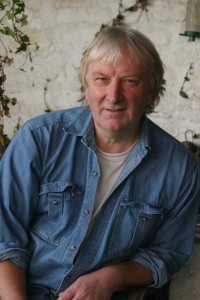
Adrian Cole began writing at the tender age of 10, although he wasn’t ready to submit professionally until he was much older – at 19. His first published work was a ghost story for IPC magazines in 1972, followed soon after by a trilogy of sword & planet novels, The Dream Lords (Zebra, US) in the 1970s. Since then he has gone on to have more than 2 dozen novels published and many short stories and his work has been translated into a number of foreign editions.
He writes science fiction, heroic fantasy, sword & sorcery, horror, pulp fiction, Mythos and has had two young adult novels published, Moorstones and The Sleep of Giants. His best known works are the Omaran Saga and Star Requiem quartets. His most recent is the novel The Shadow Academy and the anthology Nick Nightmare Investigates, which has been shortlisted for this year’s BFS Awards.
What inspired your story “A Girl and Her Dolls”?
My story, “A Girl and Her Dolls”, was inspired by my growing frustration with the way that violence escalates, sometimes uncontrollably, on all levels, and at the time I was appalled by the terrorism in the Middle East and indeed, at home in England. How many times throughout history have we seen this kind of mindless human cruelty? So I took the concept and channelled it into the relatively innocent form of a young girl, who saw herself being persecuted unreasonably and who reacted, as she thought, appropriately.
What’s the first horror story you can remember making a big impact on you?
The first story I can remember making a real impact on me was Algernon Blackwood’s “The Doll”. So maybe that impact has lasted a long time!
Name your three favourite horror writers.
Three favorite horror writers would be: Algernon Blackwood, H P Lovecraft and Jonathan Carroll, who is more than a “horror” writer – he’s certainly very dark, macabre.
Is your writing generally firmly in the horror arena or do you do occasional jaunts into other areas of speculative fiction? 
I am currently exploring horror fiction as a writer more intensively than in the past, but I have also written sf (latest novel is The Shadow Academy) fantasy (Omaran Saga), sword and sorcery (The Voidal saga) and what seems to be called “pulp” fiction, although there are differences of opinion about the latter as a genre. My Nick Nightmare, the self-styled Private Eye, Public Fist, is a series which blends and merges anything and everything that I can fit – crime, Mythos, super-heroes, black magic, Celtic lore, steampunk and so on. I am also in the process of writing a longer work, set in an alternative Romano/Celtic Europe in which characters from our history, notably Arminius, the Germanic warlord, Germanicus and Boudicca re-write history as we know it. The teacher who once told me I had an “over-active imagination” was not wrong!
What’s in your to-be-read pile at the moment?
Books to read – well, a whole lot of horror anthologies and collections, as I’m enjoying getting into the genre as much as ever. Also getting thru Bernard Cornwell’s wonderful Alfred saga (plus his work on Waterloo) – and a couple of his books as John LeCarre. And I’m always re-reading favorite stuff from the past, in particular at the moment JG Ballard. Oh, and any number of comics and graphic novels.
The 2nd Spectral Book of Horror Stories can be pre-ordered here.
August 4, 2015
The 2nd Spectral Book of Horror Stories: Kurt Fawver
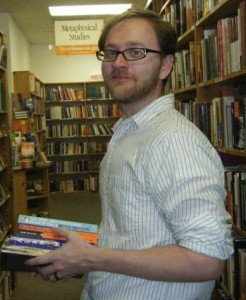 Kurt Fawver is a writer of horror, dark fantasy, and weird fiction. He’s published fiction in numerous magazines and anthologies, and has forthcoming stories in the Lovecraft eZine, Xnoybis, and Midian Unmade (Tor, 2015). Kurt has released one collection of short stories, Forever, in Pieces (Villipede Publications, 2013), and is working feverishly to compile a second. Besides fiction, Kurt also writes scholarly articles and nonfiction essays, many of which have been published in various journals and scholarly tomes, including the Journal of the Fantastic in the Arts and the Irish Journal of Gothic and Horror Studies. Kurt holds a Ph.D. in literature and teaches at a large state university where, every semester, he tries to impart to his students the necessity of horror. You can find Kurt online at kdfawver.blogspot.com or facebook.com/kfawver.
Kurt Fawver is a writer of horror, dark fantasy, and weird fiction. He’s published fiction in numerous magazines and anthologies, and has forthcoming stories in the Lovecraft eZine, Xnoybis, and Midian Unmade (Tor, 2015). Kurt has released one collection of short stories, Forever, in Pieces (Villipede Publications, 2013), and is working feverishly to compile a second. Besides fiction, Kurt also writes scholarly articles and nonfiction essays, many of which have been published in various journals and scholarly tomes, including the Journal of the Fantastic in the Arts and the Irish Journal of Gothic and Horror Studies. Kurt holds a Ph.D. in literature and teaches at a large state university where, every semester, he tries to impart to his students the necessity of horror. You can find Kurt online at kdfawver.blogspot.com or facebook.com/kfawver.
What inspired your story “Marrowvale”?
The primary inspiration for my story was my hometown, which, like the eponymous “Marrowvale”, is an unassuming, slowly eroding backwater village nestled in central Pennsylvania. The people there are largely xenophobic and highly protective of their customs and culture — a culture that, above all else, revels in tromping about the wilderness (whether to hunt game, go camping, ride all-terrain vehicles, or hold bonfire parties). Growing up, I always suspected that the people of my hometown were belligerent to outsiders because they were hiding a deep, dark secret which would, of course, manifest itself in the wilderness and be latently (if not openly) hostile toward anything from the “outside” world.
What’s the first horror story you can remember making a big impact on you?
Shirley Jackson’s “The Lottery.” I first read it in 8th or 9th grade. It’s the first story I can remember reading where the terrible things that happened within its pages had no logical cause, no good reason for occurring. There was no locus of the “evil” in the story other than antiquated and ill-defined tradition — banality at its finest. Add to that the story’s concluding ambiguity and sense that this tradition might continue indefinitely, and the tale became the first to leave me with a distinct and prescient feeling of horror, a sense that the world (maybe the universe) was ultimately not a place of rationality and order, but a sphere of chaos seething with violence and indifference.
Name your three favourite horror writers. 
It’s cliched to say, but my choice would vary from day to day. That said, three who consistently earn the distinction are William Hope Hodgson, H.P. Lovecraft, and Shirley Jackson. (But Clive Barker, Algernon Blackwood, and Thomas Ligotti often bump up into the top three as well.)
Is your writing generally firmly in the horror arena or do you do occasional jaunts into other areas of speculative fiction?
My writing is almost unequivocally dark, but it’s not always relegated to the boxes we normally check to see if something is “horror” or not. Sometimes I write stories that might be better classified as “weird fiction” and sometimes I write stories that would fall firmly in the “dark fantasy” section of the bookstore. I’ve tried my hand at incorporating SF elements into my fiction on several occasions and I even have a handful of tales that are probably closer to what we might call magical realism. I suppose what I’m saying in a roundabout way is that while I might be most proficient with horror I’ll use whatever tool from the speculative fiction shed is necessary when I see a job it can perform or a particular narrative it can best construct.
What’s in your to-be-read pile at the moment?
At times, given the size of the stack, it seems like the whole of English literature must be in there. At the moment, titles near the top include Ray Cluley’s Probably Monsters, Molly Tanzer’s Vermilion, D.P. Watt’s The Phantasmagorical Imperative, Matthew Bartlett’s Gateways to Abomination, Terrence Holt’s In the Valley of the Kings, and Sarah Lotz’s Day Four.
The 2nd Spectral Book of Horror Stories can be pre-ordered here.




